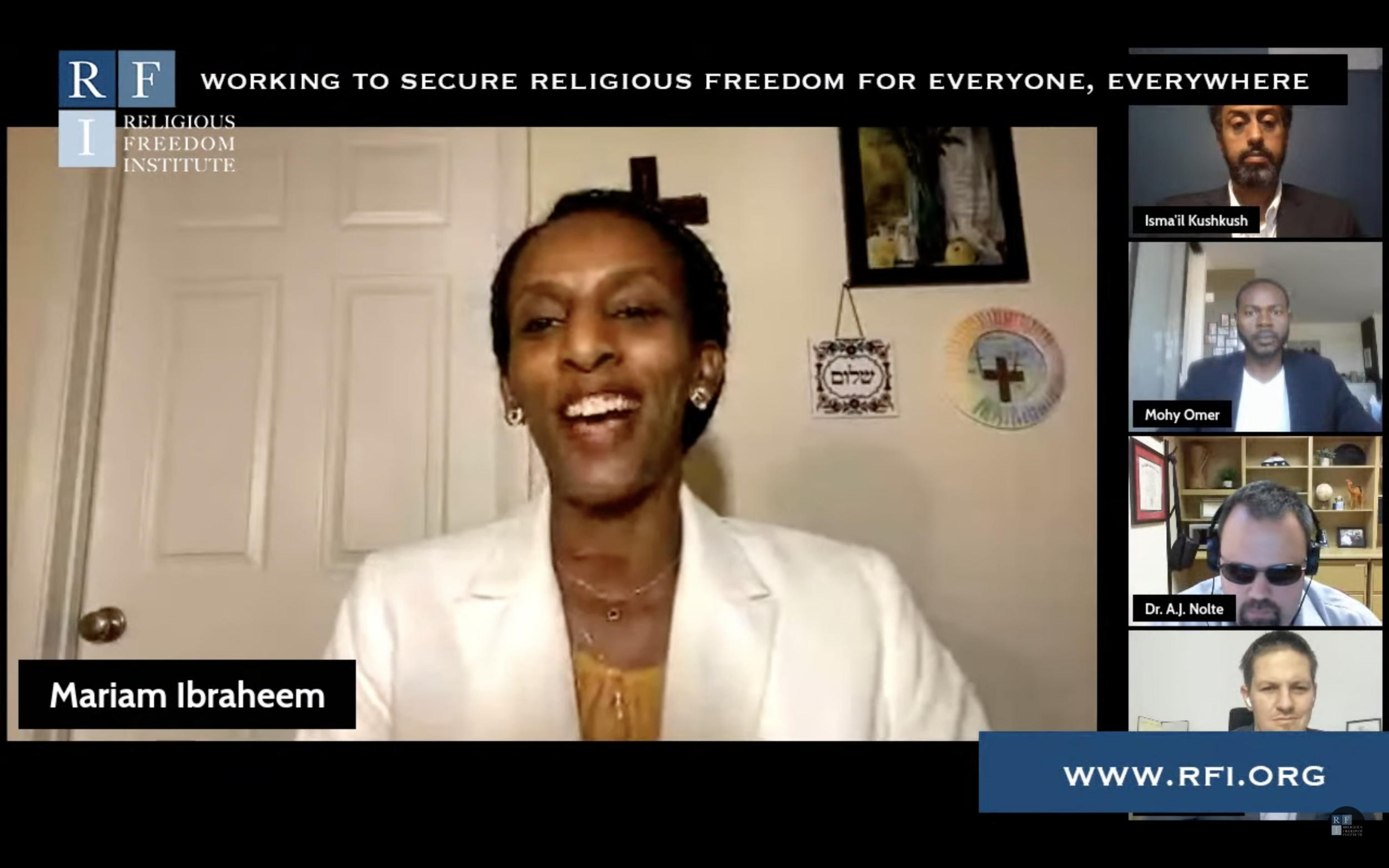On 3 November 2021, Jeremy Barker, Director of the Middle East Acton Team at the Religious Freedom Institute (RFI), led an online event focused on the recent political events in Sudan.
Isma’il Kushkush, Independent Journalist, Mohyeldin Omer, Policy Analyst for the U.S. Commission on International Religious Freedom, Dr. A.J. Nolte, Assistant Professor of Politics at Regent University’s Robertson School of Government, and Mariam Ibraheem, Director of Global Mobilization & Co-Founder of the Tahrir Alnisa Foundation, contributed to the discussion.
The event took place while Sudan was still witnessing ongoing protests in rejection of a military coup and following the release of an extensive RFI report, Documenting Changes in Religious Freedom Conditions in Sudan. Despite the recent setbacks, an optimistic tone was present in the dialogue, as it was unanimously affirmed that the Sudanese will and desire for democracy remains strong.
“…the head of the Sovereignty Council… made a statement on Sudanese television stating that they were in the process of ‘correcting the path of revolution’, and the world understood that this was clearly a coup.” | Isma’il Kushkush
On 25 October 2021, Sudan’s strides towards democracy faced a significant setback when military officers arrested civilian members of the transitional government in a self-proclaimed attempt to “…correct the path of revolution.” Protests quickly flooded the streets, with demands for justice and democracy heard in the cries of all Sudanese, voiced particularly strongly by the younger generation. The international community did not delay its condemnation of the apparent coup, viewing the military’s action as a betrayal of its previously voiced commitment to civilian rule. As financial aid from the World Bank, the U.S, the U.K, and Germany swiftly came to a halt, questions began to arise regarding Sudan’s path ahead.
“What we have seen over the last two years is progress towards advancing human rights, including religious freedom, and the government’s willingness to engage with the international community…” | Mohyeldin Omer
Following al-Bashir’s removal from power in 2019, Sudan came to serve as a beacon of hope through the Sovereignty Council’s commitment to democratic rule. Omer detailed the accomplishments of the intermittent government, specifically noting the openness with which political leaders discuss the challenges they confront when advancing human rights issues. Sudan had regularly been designated by the U.S. State Department as a country of particular concern but was then designated to only the Special Watchlist in 2019 and completely removed from all such classifications in the 2020 designations as a result of the government’s progress.
“…the government was really working towards enhancing the religious freedom of all Sudanese people.” | Mohyeldin Omer
Under the Sovereignty Council, the Public Order Law was repealed, which persecuted those who did not follow al-Bashir’s interpretation of Sunni Islam. Furthermore, the Fundamental Rights and Freedoms Act was passed, in which several key advancements were made, including, though not limited to: The decriminalization of the Apostasy Law, annulment of guardianship laws, and designation of Christmas as a national holiday. In March of 2021, the Declaration of Principles, which called for the separation of religion and state, and the incorporation of various rebel groups into the military to facilitate diversity, was signed. While temporarily paused, the Sudanese citizenry has not forgotten these advancements.
“…if you have a military that reflects the ethnic and religious pluralism of Sudan, then you will prevent a military coup and preserve religious freedom in Sudan for the next fifty years.” | Dr. A.J. Nolte
After the progress made by the Sovereignty Council, the painful cyclical history of coup-d’etat after coup-d’etat ended, and the people now adamantly refuse to succumb to yet another age of military rule. Kushkush argues that a mutual agreement will have to be made between the military and the citizenry to grant any ruling entity legitimacy and observes a strong desire among the people to see themselves reflected in the government.
To reflect the populace within the government and military, Dr. A.J. Nolte asserts that religious pluralism often naturally leads to the diversification of governing entities and, subsequently, an investment in human rights. He suggests analyzing the amicable relationship between the Christians and Muslims of the Nuba Mountains to understand better why such pluralism has flourished there and whether it can be replicated in the case of Sudan. Regardless of Sudan’s political future, Omer advises the U.S. to keep religious freedom as the focal point of every discussion held with Sudanese leaders.
“We need to listen to what the people on the street want… there’s no chance that people will accept military leadership or military government in the country anymore… It’s been a very long journey… we want to see our country become a better and safer place.” | Mariam Ibraheem
Despite the ambiguity that presently shrouds the country’s future, Ibraheem undoubtedly places her hope in the people who continue to demand justice every day. She is confident that they will not rest until democracy is restored. Their heightened awareness of human rights has only further fueled their desire for a government that reflects the will of the citizenry. While the question of what the government of Sudan will be remains to be answered, the people are more committed to the causes of democracy and human rights than ever previously witnessed within the Sudanese context.
THE RFI BLOG

Does Southeast Asia Lead the World in Human Flourishing?

RFI Leads Training Session on Religious Freedom Law and Policy for U.S. Army War College

Oral Argument in Charter School Case Highlights Unconstitutional Motives Behind OK Attorney General’s Establishment Clause Claim

Largest Longitudinal Study of Human Flourishing Ever Shows Religion’s Importance

Keys To Human Flourishing: Faith And Relationships Outweigh Wealth
CORNERSTONE FORUM

Reaffirming Religious Freedom: Bridging U.S. Advocacy and Iraq’s Constitutional Framework

Political Polarization, Same-Sex Marriage and Religious Liberty

Bridging the Gap Between International Efforts and Local Realities: Advancing Religious Freedom in the MENA Region

Challenges to Religious Freedom in Iraq and the Critical Need for Action


